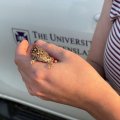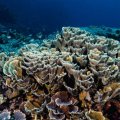A researcher who played a major role in the emergence of Brisbane as a centre of biological research has been recognised for his achievements by being awarded the $10,000 CSIRO Eureka Prize for Leadership in Science.
Professor John Mattick, AO, from the Institute for Molecular Bioscience at The University of Queensland, will receive his award at a gala award dinner tonight (Tuesday August 22).
Professor Mattick was the main force behind the establishment of the Institute for Molecular Bioscience (IMB) and the Australian Genome Research Facility.
It was back to back awards to UQ, as Professor Mattick follows Australian of the Year 2006 UQ`s Professor Ian Frazer, who was awarded the 2005 CSIRO Eureka Prize for Leadership in Science.
Under Professor Mattick’s guidance, IMB has become one of Australasia’s leading research institutes, with over 400 staff and students working in areas such as the human genome, cancer biology, organ development, repair and regeneration, cystic fibrosis, alternative energy sources, and diabetes.
“John’s initiatives have not only benefited Queensland, their flow-on effects have been the realisation for many key opinion leaders of the importance of investing in biotechnology for Australia’s future – a realisation that has seen a much-needed increase in support for the science enterprise in many states,” the prize committee said.
Professor Mattick originally joined The University of Queensland in 1988 when he founded the Centre for Molecular and Cellular Biology, which was later merged with UQ’s Drug Design and Development Centre, established by Professor Peter Andrews, AO, to form IMB.
Professors Mattick and Andrews were appointed co-directors of IMB, until Professor Andrews left in 2003 to become Queensland Chief Scientist.
Professor Mattick then became the sole Director of IMB until the end of 2005, when he stepped down to concentrate on his research challenging the dogma of so-called “junk DNA”, the 98.5 percent of our DNA that does not code for genes and until now has not been thought to do anything.
Professor Mattick believes that it actually constitutes a hidden regulatory system that directs our development, and explains why humans are so much more complex than organisms such as worms, which have almost as many genes.
• A second University of Queensland researcher, Christian Weedbrook of UQ`s School of Physical Sciences, will share in the $10,000 University of New South Wales Eureka Prize for Scientific Research. Mr Weedbrook is part of a team including Dr Thomas Symul, Andrew Lance and Dr Ping Koy Lam of Australian National University.
Christian Weedbrook is a PhD student in the Quantum Optics and Quantum Information Group at The University of Queensland led by Professor Tim Ralph.
Professor Ralph said Mr Weedbrook helped to develop a new, more efficient Quantum Cryptography scheme that was subsequently experimentally demonstrated by collaborators at the Australian National University.
He said security of communications was ensured by the receiver and sender sharing a secret key known only to them.
"Security is breached if an eavesdropper can obtain information about the secret key. Quantum Crytography uses the strange `quantum` properties of fundamental particles to make successful eavesdropping impossible and thus ensure security," he said.
"The new system that has been developed is based on standard laser sources rather than exotic `single-photon` sources, and is simpler and potentially faster than current protocols."
Media contacts:
Professor John Mattick: 07 3346 2079
Sue Nelson, Quick Thinking Communications: 02 9907 8241 or 0403 343 275
Professor Tim Ralph: 07 3346 9693
Jan King UQ Communications: 0413 601 248


